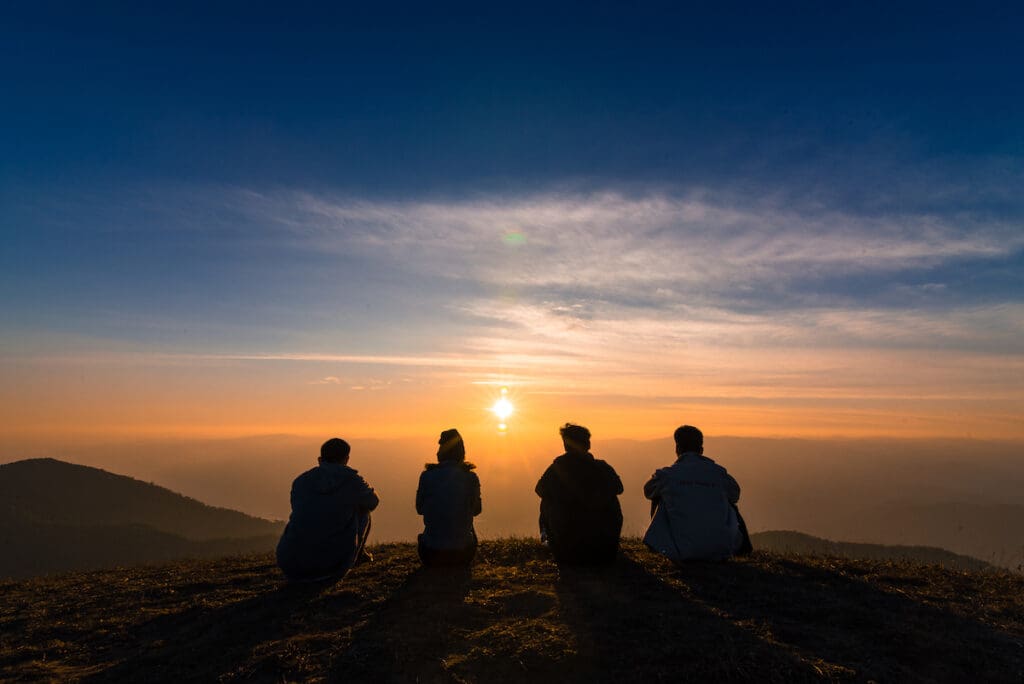
Wildfires, alongside major droughts, storms, and sea level rise, are among the most tangible impacts of global climate change. But not all consequences of the climate crisis leave such a visible scar; the stresses of today’s environmental crises have worked their way into our communities, relationships, and mental well-being.
Especially impacted are young people, with more than half of 16- to 25-year-olds feeling that humanity is doomed by climate change, according to a recent global survey.
The Mind & Life Institute sees addressing eco-anxiety as critical to navigating the challenges of the climate crisis and relieving suffering for all. We investigate how the union of contemplative wisdom and science can lead to greater awareness of the interconnectedness of all life—and action—to support and sustain both individuals and the Earth’s living systems. Said climate activist Dekila Chungyalpa during a recent Mind & Life-moderated panel discussion, “We have to acknowledge that what happens to us internally affects what happens to our communities, and that [in turn] affects what happens to the planet. All three things are indivisible.”
Starting last year, 17 members of Mind & Life’s staff, Steering Council, and Board of Directors participated in the Council on the Uncertain Human Future (CUHF), a weekly small-group guided discussion to explore the climate crisis: its root causes, future implications, and how to live in this present moment.
In two, five-week cohorts, the Council fostered deep listening and helped participants tap into something larger than individual narratives and perspectives around climate change. “What can come from a collective is way more powerful than what can be on our own,” said Lama Liz Monson, Associate Spiritual Director of the Natural Dharma Fellowship and co-leader of the Mind & Life CUHF cohorts.
Meeting weekly for two hours via Zoom, participants explored how each of us characterize this time we’re living in. Many shared how the irreversible changes caused by environmental degradation and the disregard for loss of life—human and otherwise—are categorized by deep grief and frustration. Others emphasized the need for compassion and healing. “As Mind & Life leans into climate change,” says President Susan Bauer Wu, “it’s essential that we create spaces for our team members to come together and share their feelings around this crisis and form mutual support networks.”
“As Mind & Life leans into climate change, it’s essential that we
create spaces for our team members to come together and share their feelings
around this crisis and form mutual support networks.”
Participants brought to the Council their own understanding of the climate crisis as a relationship problem—a point driven home at Mind & Life’s 2021 Summer Research Institute. “We need to stop looking at climate change as an external problem and more of a human relationship crisis,” said internationally-renowned expert in sustainable development Christine Wamsler. Christine and other faculty emphasized the need for a more holistic perspective. “The current climate change crisis is not just caused by increased concentrations of greenhouse gasses… but by breakdowns in kinship relationships,” said Indigenous scholar Kyle Whyte.
What became clear through intimate, small-group sharing during CUHF is that we are not alone in the crisis of climate change, and contemplative practice is one tool we can all access to cultivate compassion for ourselves and others as we face an uncertain future. Below, Lama Liz offers a meditation practice for the natural world and reawakening the joy within.
Download the meditation here.
Above all, we cannot lose hope. Community, compassion, and dialogue can move us beyond despair to an era of possibility and action. Lama Liz closed Mind & Life’s final CUHF session with wisdom from the elders of the Hopi Nation of Oraibi, Arizona:
“There is a river flowing now very fast. It is so great and swift that there are those who will be afraid. They will try to hold on to the shore. They will feel they are torn apart and will suffer greatly. Know the river has its destination. The elders say we must let go of the shore, push off into the middle of the river, keep our eyes open, and our heads above water. And I say, see who is in there with you and celebrate. At this time in history, we are to take nothing personally, least of all ourselves. For the moment that we do, our spiritual growth and journey comes to a halt.
The time for the lone wolf is over. Gather yourselves! Banish the word struggle from your attitude and your vocabulary. All that we do now must be done in a sacred manner and in celebration. We are the ones we have been waiting for.”
We hope you’ll find comfort and resilience in these Mind & Life resources for facing the climate crisis and cultivating your own human-earth connection:
- Connection, Community, and Compassion: Resources for our Emotional Well-Being (blog)
- Mind & Life Conversation with the Dalai Lama: Embracing Hope, Courage, and Compassion in Times of Crisis (video)
- The Mind, the Human-Earth Connection, and the Climate Crisis (online course)
- Transformative Social Emotional Learning as a Catalyst for Climate Action (blog)
- Vandana Shiva on Earth Democracy (Mind & Life podcast)
- “Integrity and Moral Suffering in Relation to the Climate Catastrophe and Health” with Roshi Joan Halifax (video)
- 6 Days, 28 Speakers, 1 Powerful Message: The Climate Crisis, It’s a Relationship Problem (blog)

